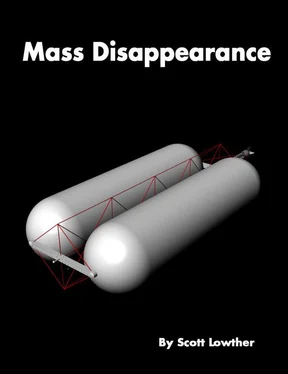Scott Lowther - Mass Disappearance
Здесь есть возможность читать онлайн «Scott Lowther - Mass Disappearance» весь текст электронной книги совершенно бесплатно (целиком полную версию без сокращений). В некоторых случаях можно слушать аудио, скачать через торрент в формате fb2 и присутствует краткое содержание. Год выпуска: 2014, Издательство: Scott Lowther Selfpublishing, Жанр: Космическая фантастика, short_story, на английском языке. Описание произведения, (предисловие) а так же отзывы посетителей доступны на портале библиотеки ЛибКат.
- Название:Mass Disappearance
- Автор:
- Издательство:Scott Lowther Selfpublishing
- Жанр:
- Год:2014
- ISBN:нет данных
- Рейтинг книги:3 / 5. Голосов: 1
-
Избранное:Добавить в избранное
- Отзывы:
-
Ваша оценка:
- 60
- 1
- 2
- 3
- 4
- 5
Mass Disappearance: краткое содержание, описание и аннотация
Предлагаем к чтению аннотацию, описание, краткое содержание или предисловие (зависит от того, что написал сам автор книги «Mass Disappearance»). Если вы не нашли необходимую информацию о книге — напишите в комментариях, мы постараемся отыскать её.
http://up-ship.com/blog/?p=24365
Mass Disappearance — читать онлайн бесплатно полную книгу (весь текст) целиком
Ниже представлен текст книги, разбитый по страницам. Система сохранения места последней прочитанной страницы, позволяет с удобством читать онлайн бесплатно книгу «Mass Disappearance», без необходимости каждый раз заново искать на чём Вы остановились. Поставьте закладку, и сможете в любой момент перейти на страницу, на которой закончили чтение.
Интервал:
Закладка:
“What the fuck am I looking at?” I thought that was a fair question. Nobody answered.
As we watched the whatever-it-was squatting on Yenne, George started putting basic planetary data on the screen. As we watched, the diameter of the planet began to shrink, very slowly. The cracks grew in number, but not in brightness. In fact, they began to dim. The thing was actually sucking the planet dry from the inside, like a giant mosquito. It was spraying the interior of the planet out into space, making a cloud of debris. George finally had something to say… the mass of the planet was decreasing. “I can see that,” I said. “It’s being shot into space.” But that wasn’t it. Incredibly powerful gravity waves were being emitted from the thing next to the planet; and the total mass of the system - planet, thing and cloud - was decreasing. The spray of stuff was only a small fraction of what was being sucked out of the world.
“Where’s the mass going?” Sarah asked. I thought it was a fair question.
George gave the AI equivalent of a shrug: silence. Mass was simply disappearing… it wasn’t moving elsewhere, it wasn’t going into hyperspace, it wasn’t — entirely — being converted into gravitational energy or any other form of energy we could pick up. It simply was being made to no longer exist. This is of course impossible.
Also impossible: a mechanical structure that big, able to withstand the stresses it was clearly under. We’ve built things bigger than worlds… O’Neills a thousand kilometers in diameter, fifteen thousand kilometers long. But those are just big eggshells, using the strongest materials known, stressed in tension, pushing the limits of safety margins. All they do is sit there and rotate. But the thing over Yenne… I couldn’t begin to comprehend the engineering that would let such a mechanism actually work. A structure thousands of kilometers tall and wide that can actually stand on a sizable terrestrial world, never mind move? George confirmed that the material strength that a mechanism that size would need would be many orders of magnitude beyond what was thought possible. It would need to have a tensile strength that approached the nuclear binding strength… and yet it would have to be really light. George was puzzling over the mass detectors, and as far as he could tell, apart from the growing cloud of debris, the combined mass of the planet and the thing was centered directly on the center of the planet. That meant that the thing , big as a moon, could not have massed much more than a big mountain. It had to have the density of thin gas.
The sun was mostly behind it, a bit to the side, but the whole thing was lit, glowing. It appeared to be translucent, like frosted glass. It was white, but not so much the white of fine china, more like the white of maggots or some decaying dead thing. We could make out, just barely, the shadows of internal structures: they gave the impression not so much of machines but of organs.
It was all very wrong.
“I want to go,” Loff said. If you’ve ever seen a Thessi panic, you might mistake it for being extremely cool and collected. He was a statue. A fuzzy four-armed statue.
“Attention,” George said. The telescopic view slewed; for a second or two, just streaks of stars blowing past. Then it settled on a big white disk… Jenkins. White stripes, storms, the standard complement of rings that I’ve come to expect from small gas giants. Then I realized… those weren’t rings. Jenkins didn’t have rings. What it had was a series of tentacles that wrapped around the planet and plunged into the atmosphere, who knows how deep. The gas giant had its own thing , latched on like a tick. But this one was bigger. The same size relative to Jenkins as the one at Yenne was to its world. As impossible as the thing at Yenne was, this one was many times more impossible.
“How long till we can leave?” Sarah asked, kinda quiet-like. George told her more than twenty minutes. She muttered something unladylike, I forget what, but I remember that I agreed with the sentiment.
“Why didn’t you spot these when we first arrived in-system?” I asked George. He pointed out that he’s only got the one good telescope, and that it had been pointed at Gunston Station. Smaller optics had located Jenkins, but didn’t give a clear enough view to spot the thing .
Then it got worse. While we watched the thing at Jenkins, the tentacles (there were no obvious joints, just a long flexible curve, so I figured they looked more like tentacles than spiderlegs) sort of shuddered, then began to pull out. Streamers and blobs of cloud the size of continents were pulled out with them, along with white-hot glowing gas from deeper down. I’ve seen people get shanked with knives and swords, and some blades when you yank them out innards come out with them. Jenkins looked like that.
The body the tentacles were attached to was on the far side of the world; it came rising over the pole. Again it looked like slow motion, but the speed involved must have been incredible to clear the diameter of a gas giant in only a few dozen seconds. Anyway, the thing sat there floating in space above the pole of the planet, shaking its tentacles like a dog shaking off wet fur, and apparently impervious to the planets gravity. It looked like… I dunno, a cross between a squid and a spider, maybe? We were frozen. I’d like to say we were frozen in wonder or amazement or some such bullshit, but it was fear, flat-out. Things that violate the laws of physics, eat planets and make mass disappear? You’d have to be crazy not to be afraid. But then it got worse than fear. I’ve never felt anything like it, before or since, but this overwhelming feeling came over me. All four of us, George included: “ It’s looking at us.” We all just knew. It was not a good feeling. We did not want that thing looking at us, knowing we were there. Beyond the fact that it looked like a demonic tarantula and it ate whole worlds, we — all of us, including George — could sense malevolence from the thing . The three of us organics all got faintly nauseous, a bit of a headache, and deep sense of cold, though the temperature never varied. I heard the cat, somewhere else on the ship, screaming. Then the thing started to move. It flexed its tentacles like an octopus might; spread them out wide and radially, then quickly brought them together behind its body. Remember, the tentacles were long enough to hug a gas giant with a death grip, and it was able to whip them together in just a few seconds. When it did that, we could see the shadow of the thing pass over the face of Jenkins. It was coming directly at us.
The telescope quickly slewed again, back to Yenne. The thing at that world had already abandoned its world and was well on its way straight towards us. George could detect no emissions from either thing indicating a conventional propulsion system. The gravity detectors no longer picked up gravity waves from them, so they weren't using some sort of inertialess gravity drive. They were just… swimming. And accelerating at an incredible rate. “Sure, swimming through the vacuum of space,” I said. “Why the hell not. Of course they would, wouldn’t they…” Strangely, I broke free of the grip of those things before even George did. I grabbed the controls and put us ass-end towards the closer of the two, the one from Yenne, and poured the coals into the sublight drive. Didn’t care where we were going, just away from them . This seemed to snap everyone else out of it. Loff chucked into a barf bag.
“Please tell me we can go to hyperdrive,” Sarah said. It was not phrased like a request, but an order.
Читать дальшеИнтервал:
Закладка:
Похожие книги на «Mass Disappearance»
Представляем Вашему вниманию похожие книги на «Mass Disappearance» списком для выбора. Мы отобрали схожую по названию и смыслу литературу в надежде предоставить читателям больше вариантов отыскать новые, интересные, ещё непрочитанные произведения.
Обсуждение, отзывы о книге «Mass Disappearance» и просто собственные мнения читателей. Оставьте ваши комментарии, напишите, что Вы думаете о произведении, его смысле или главных героях. Укажите что конкретно понравилось, а что нет, и почему Вы так считаете.












